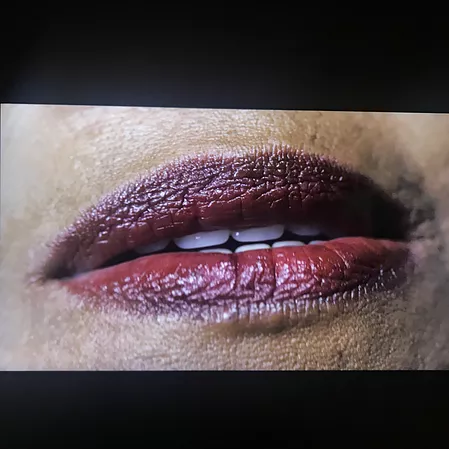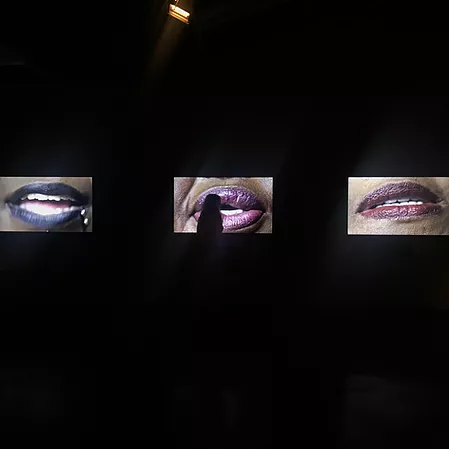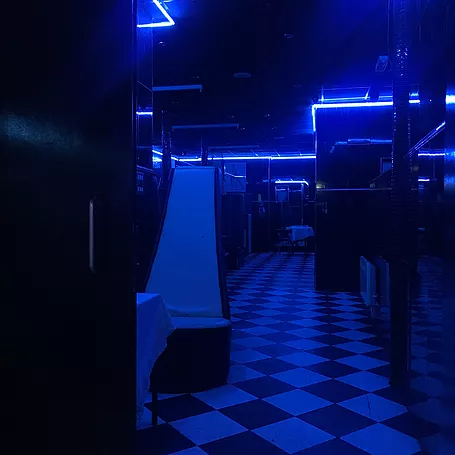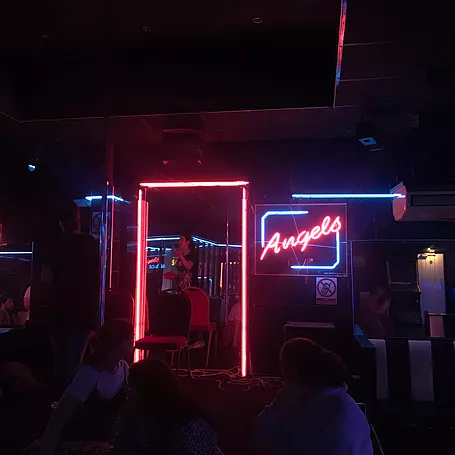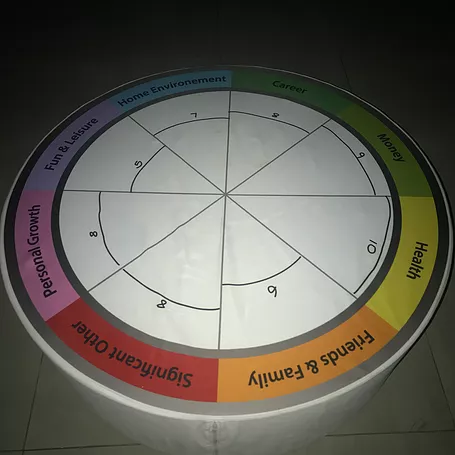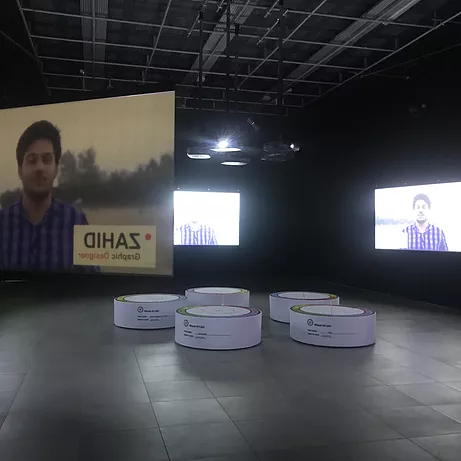REAL WORK @ Fact Liverpool
GDLP
Emoji summary: 😩💰🚶♂️
Last month I wrote a baby essay on why it drives me mad when cis non-disabled white women make art with and about themselves when that’s all it is. so much of it presents a narcissism I can’t be bothered with when in the context of art and exhibitions, and it’s there it undermines more pressing identity politics. I was pointing at a lot of people when I wrote that including White artist sex workers, wishing with all my heart and soul that everything under this genre of White Woman Art would grow into something less one-dimensional, something that engages with proper intersections of feminism, labour, and life in general. A few people kicked off as per uzjj but i think it was fair to put it out there that i would rather see a selfie on your personal (and please post as many as you like, I will be there commenting fire emojis every time) than have it taking up space in a gallery when your beauty as a white woman as SUBJECT alone is kind of banal, and there’s bigger conversations to be having right now. White Woman Art by sex workers is also the dominant aesthetic in that arena, which just seems like a waste. Well anyway, it’s like the universe tried to throw me a bone and be like hi, here’s an exhibition by a white woman who isn’t present in the work itself, AND is speaking to sex workers. There! Isn’t that what you wanted? Will you shut up now? No, i am afraid I’m about to run my mouth once more bc this one is a mess.
REAL WORK is a show at FACT in Liverpool, 2 different artworks by 2 diff artists. Downstairs, Liz Magic Lazer (why is this artist’s name soooo 90s butlin’s entertainer, I can’t) has a video installation about online freelancing, which i’ll get to. And upstairs is Candice Breitz’s piece ‘SWEAT’ showing 10 interviews on separate screens with sex workers in south africa from the Sex Workers Education & Advocacy Taskforce. You walk into a dark gallery space and can see close-ups of 10 people’s mouths on flatscreens along the walls, all talking at the same time. it’s impossible to make out what anyone is saying unless you walk riiiight up to them, until ur inches away from the screen. Tbh I couldn’t really stand the physical experience of this show because I couldn’t comfortably hear what was going on, but the 10 films (which are all a few minutes long) are on vimeo so I watched them at home instead. I learnt a lot about everyones exp of being a sex worker and appreciated the urgency, emotion, candidness, and plea for people to get over it and respect sex work in the same way they would any other job. there is a quick clarity in the way the interviewees speak. Like, hearing Zoe say, ‘to all the feminists that think sex workers can’t be feminists, let us set our own agendas. Let us be heard instead of white privileged women setting the agenda. Our struggles are not their struggles, our struggles are real. We make our own choices. Why should I do a job that pays less when my own vagina can make me an income? My body, my business, deal with it’ - like that should shut anyone up, it just is what it is, and anyone should be able to go to work, make money, feel safe, go home and live their lives. It’s also Zoe that says ‘some [white men] get obsessed with beauty of African women. I don’t know what’s happening in white homes that white men are running out to get black pussy but it’s part of life! The whole idea of wanting something different. The same people that enslaved you are now coming to seek pleasure.’
That last clause in particular made me take a step back and think about the power play between artist + subject, which is always there but is worth examining here. the subjects in this instance are sex workers yeah, 9 black people 1 white, mostly women, cis and trans, and they’re presenting interesting and direct accounts of their lives. They’re being paid for this which is the bare minimum we can expect for writing, speaking and using themselves, but okay. And the artist? Is a white south african woman in Candice Breitz who has taken their stories as they are and is presenting them as her artwork all the way over here in Liverpool, and previously exhibiting it in Berlin and selling the series at Art Basel from what i can gather from google. But tbh, I don’t really think there is much art here beyond the art of taking credit for other people’s work. I get the same vibes here as I do with most documentary filmmakers, and most of the shit VICE makes - like, it’s presenting something Other to a mainstream gallery-going audience (read: white) and being like wow, I know, right? Remember what Zoe said, ‘The same people that enslaved you are now coming to seek pleasure.’ Candice making this art reminds me of the way Louis Theroux goes about patronising people; the way you know he probably carries handsanitizer to cleanse himself after speaking to anyone that’s not as white and middle class as he is. What the sex workers in SWEAT say and how they say it is solid, and in a way, for the artist to have edited into that or transformed the content in any way might have been a mishandling of their words. My discomfort comes in part from Candice’s name being the biggest on this project when she has done the least (like a good coloniser does), but that’s coupled with a more lasting discomfort with regards to how this artwork sits in the context of her wider practice, which q frankly gives me the willies. This is an artist who made the Whiteface series where she ‘cuts a young, black woman’s face out of a postcard and photographs herself holding this ‘mask’ up to her own face… The cut out black face, if read as a kind of ‘African mask’, could allude to the predominantly white art world that has abused a so-called exotic African subjectivity’ as per Ruth Kerkham Simbao’s account in ‘A Deadly Explosive on Her Tongue: White artists/Black bodies’ in Third Text (2000). The same text quotes Okwui Enwezor’s 1997 essay ‘Reframing the Black Subject: Ideology and Fantasy in Contemporary South African Representation’ where he writes that Breitz ‘is just too much in a hurry to show her unimpeachable feminist credentials and her equally enlightened sympathy towards the much abused African woman.’ Is this not it? Did Breitz miss the memo on her own work as offered by black critics? She really just ignored it and carried on exploiting black bodies, who in this case are also sex workers, for some content she would then package as her own art? I know the interviewees might be like ok we were paid for it so who cares and i respect that as a transaction, but what doesn’t make sense to me is Candice building a career off of the back of this process. the names of the 10 interviewees are on the wall text but it’s hers over the door. doesn’t that feel awkward? doesn’t that feel very… white south african?
As part of this exhibition, there was an event programmed called Sex Work City Walk n i went along because i had all of the above thoughts floating in my head. I think sex is a big part of my own personality so i’ve always found it exciting and like, honestly just normal that you could make money from full contact sex work or camming or just being fit and a good dancer in a club (worlds oldest profession anyway, isn’t it; and I know what I’m saying is not exactly a hot-take, I just thought I should make my position clear if it wasn’t already). I know sex work is a hard graft but I don’t know specifics and I wanted to learn more. So, this event. Dr Gemma Ahearne, who is a researcher, academic and activist from and based in Merseyside, led the tour of the exhibition and then we went out and about in pouring rain to strip clubs in Liverpool on a Saturday afternoon. When she introduced the show, she made a comment at the beginning that stuck with me. where I’d found the overlapping of sound in the exhibition space stressful, she’d appreciated it because as a former dancer who had to contend with the noise and rowdiness of male clients, she enjoyed the inverse here and the fact it was the visitor having to get up close to the sex workers to make out what they were saying, rather than it being the other way around. Ofc having never worked in this industry, that’s not an experience I could assume so I was glad for the perspective and wanted to make sure I included it here. The rest of the tour was a tonne of up to date information about the logistics of clubs in the area, policies, licenses, and details I had no idea about - like how the police force in Merseyside is the only one to consider violence against sex workers a hate crime if the assault occurs while they are on the job. I didn’t know Brothels are illegal but can exist in this in-between state where the police won’t shut them down but’ll check in on them to make sure the workers are okay and to watch out for trafficking victims. There are 8 licensed strip clubs in Liverpool, and one is ran by a woman and coincidentally that one is more friendly to women clients - who are sometimes rejected from establishments because they can be violent to dancers (and in some cases have filmed them illegally to out them online, jeeezus). In the second hour of the tour we went to a club a 10 minutes walk away from FACT, and Gemma showed us how the space is designed and furnished for the girls’ safety. Couches with low backs so you can see across the room, security cameras everywhere, and she said if clients are not sat down or walking to and from the toilets then they’ll be asked to move. She spoke about a friend of hers who also used to dance and is now researching knee problems and injuries in lap dancers. All these things I never knew about before,,, like I felt so appreciative and glad I could attend. this access to somebody’s experience and knowledge, them being in the room, speaking for themselves, unfiltered, in this setting all sat around the club and having an open chat about sex work and safety - I think i felt more at ease as the consumer in this situation because everything was on the table. Compare the tour to the exhibition, where a white south african artist with a history of making racist work involving black bodies has taken the stories of sex workers and packaged them as a nice artwork for herself… I could and couldn’t fuck with that. This is why I hate art sometimes. It doesn’t exactly do itself any favours. so long and messy. there’s something about the transaction of art and visiting art; interviews and listening; and a tour and following in the context of talking about sex work, where only the tour was straightforward, so it’s only the tour i could enjoy / accept / engage with on a level.
My thoughts n feelings about the downstairs exhibition are a bit, er, shorter. This part of the show was commissioned under Culture Liverpool’s The Future World of Work as part of the 2018 programme (special-ish year happening 10 years after we were the capital of culture incase u are interested). Liz Magic Lazer’s piece ‘IN REAL LIFE’ brought together 5 gig workers via online freelancing channels to participate in and partly make the work. The gig workers included a Script Writer, Whiteboard Animator, Graphic Designer, Voiceover Artist and Beauty Blogger from the UK, Nigeria, Pakistan and Hong Kong. The piece is installed on 5 hovering projections in a circle, and u can plonk yourself in the middle of them. It was well done but weird. As a stressed out semi-gig worker myself I found it depressing, and it made me feel a bit like I did when I found out the big players in the art world actually get teams of assistants to make their work. Jeff Koons with a metaphorical whip keeping young artists up all night to finish what he started. Gormley directs and other people make. So, for an artist to make a meta piece of art about gig work that is built through the products of gig-workers depressed me because I wished the artist would have subverted precarity instead of just putting some more of it into the world. It wasn’t critical in the way I needed it to be. It was weirdly smiley and Black Mirror instead.
So apologies for this sad complaint of a review. i am wanting better from art, and i keep on wanting more from artists. not to be cringey but they need to be setting a better example for future generations of artists: working with people on a level, not banking on marginalised identities as a career ???, u should be doing what you can to put systems in place so the workplace is healthier and fairer for all, and maybe a bit of optimism would be good instead of submission and incredulousness. these are my demands, ok goodbye.
